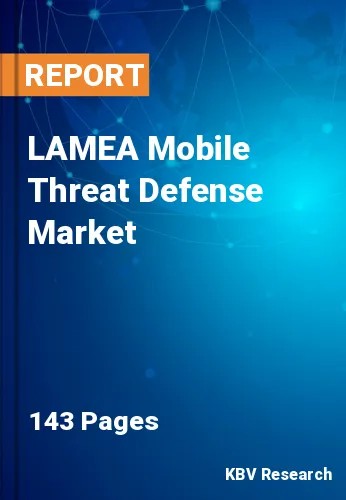The Latin America, Middle East and Africa Mobile Threat Defense Market would witness market growth of 26.6% CAGR during the forecast period (2023-2029).
The security of mobile devices is now more important than ever, as users increasingly depend on them for essential duties such as online banking, communication, and business transactions. Adopting multi-factor authentication (MFA) is one of the finest mobile threat defense strategies. MFA is a comprehensive security measure that requires users to provide multiple forms of identification before gaining access to sensitive information or services. This typically entails a combination of something the user knows, like a password, something the user possesses, such as a physical token or a smartphone, and something the user innately possesses, such as biometric data, such as a fingerprint or voice recognition.
By implementing multi-factor authentication, one can substantially reduce the risk of unauthorized access, protect sensitive data, and ensure a more secure mobile experience. The growing hazard of malware and phishing attacks has become a significant concern for organizations in today's fast-paced business environment. To maintain secure business networks and safeguard sensitive information, companies must adopt strict security protocols and invest in strong cybersecurity strategies.
The Israeli government approved a national initiative with a 922-million-shekel budget to promote the digital health sector over five years. The Israeli industry for this technology is expanding swiftly since it has the potential to improve patient care significantly. A population's disease patterns can be researched, previous treatment knowledge can be used, medications and other technical products may be developed, and tailored medical care can be promoted owing to the analysis of this data. As more people become aware of the benefits of eHealth and the government gives funding to implement it, there will likely be an increase in the demand for cybersecurity solutions to protect patients' sensitive data. Due to this, the market in the region will grow.
The Brazil market dominated the LAMEA Mobile Threat Defense Market by Country in 2022 and would continue to be a dominant market till 2029; thereby, achieving a market value of $191.3 million by 2029. The Argentina market is experiencing a CAGR of 27.2% during (2023 - 2029). Additionally, The UAE market would exhibit a CAGR of 26.2% during (2023 - 2029).
Based on Component, the market is segmented into Software and Services. Based on Operating System, the market is segmented into Android, iOS, Windows and Others. Based on Deployment Model, the market is segmented into Cloud and On-premise. Based on Organization Size, the market is segmented into Large Enterprises and Small & Medium-sized Enterprises(SMEs). Based on Vertical, the market is segmented into IT & Telecom, Manufacturing, BFSI, Government, Transportation & Logistics, Healthcare & Life Sciences, Education, Retail & Ecommerce and Others. Based on countries, the market is segmented into Brazil, Argentina, UAE, Saudi Arabia, South Africa, Nigeria, and Rest of LAMEA.
Free Valuable Insights: The Worldwide Mobile Threat Defense Market is Projected to reach USD 8.6 Billion by 2029, at a CAGR of 22.3%
The market research report covers the analysis of key stake holders of the market. Key companies profiled in the report include Cisco Systems, Inc., SAP SE, Broadcom, Inc., VMware, Inc., Citrix Systems, Inc. (Cloud Software Group, Inc.), Micro Focus International PLC (Open Text Corporation), Zoho Corporation Pvt. Ltd., SolarWinds Corporation, Sophos Group PLC (Thoma Bravo) and BlackBerry Limited.
By Component
By Operating System
By Deployment Model
By Organization Size
By Vertical
By Country
Our team of dedicated experts can provide you with attractive expansion opportunities for your business.

